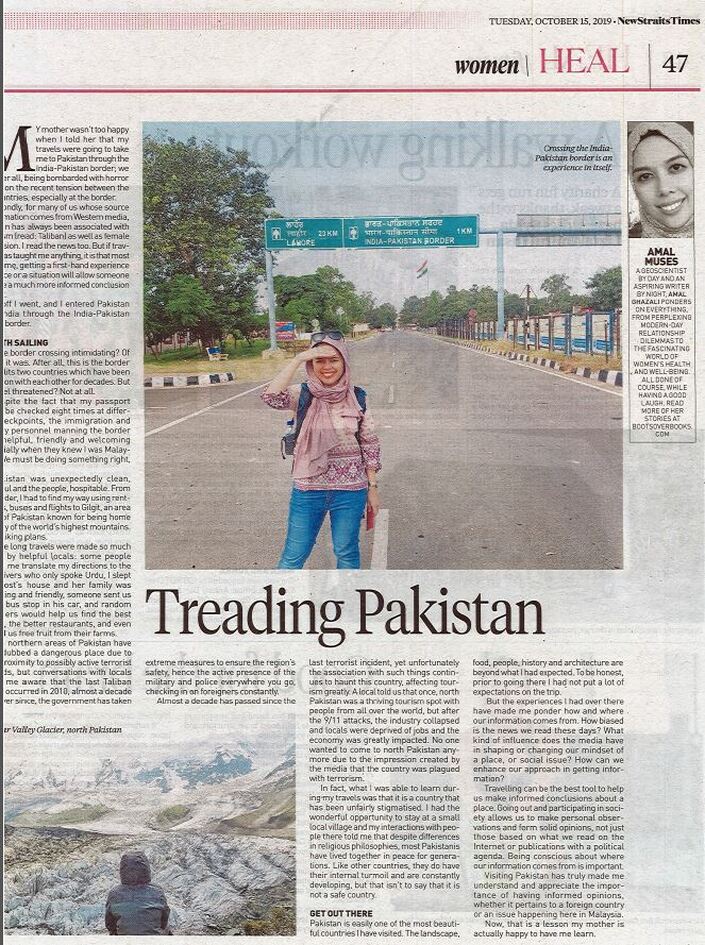|
Treading Pakistan
By Amal Ghazali My mother wasn’t too happy when I told her that this time around, my travels were going to take me to Pakistan through the India-Pakistan border. First of all, the news have been bombarding us with horror stories about the recent tension between these two countries, especially around the border regions. Secondly, for many of us whose main media is derived from the West, Pakistan has always been associated with the sentiments of terrorism (read: Talibans) as well as female oppression. I read the news too. But if travelling has taught me anything, it is that most of the time, getting a first-hand experience of a place or a situation will allow someone to make a much more informed conclusion about it as compared to just reading about it from a biased point of view. So off I went, and I entered Pakistan from India through the India-Pakistan Wagah border. Smooth Sailing Was the border crossing process intimidating? Of course it was. After all, this is the border that splits two countries who have been in crisis with each other for decades. But did I feel threatened? Not at all. Despite the fact that my passport had to be checked 8 times at different check points, the immigration and military guys manning the border were helpful, friendly and welcoming (especially when they knew I was a Malaysian. We must be doing something right, guys!). Pakistan was unexpectedly clean, beautiful and hospitable. From the border, I had to find my way through rented cars, buses and flights to get to Gilgit, an area north of Pakistan known for being a home to many of the world’s highest mountains, as I had hiking plans there. The long travels were made so much better by the helpful locals - some people helped me translate my directions to the taxi guys who only spoke Urdu, I slept over a host’s house and her family was charming and friendly, someone sent us to the bus stop with his car, and random strangers would help us find the best routes, the better restaurants, and even offered us free fruits from their farms. As I explored Pakistan, I was on high alert to see the possible consistency between what I’ve heard from the media I was exposed to versus observations I could make on my own from the time I actually spent there. The northern areas of Pakistan have been notoriously dubbed as a dangerous place to be due to its close proximity to possible active terrorist grounds, but conversations with locals informed me that the last Taliban attack occurred in 2010, almost a decade ago. Ever since, the government has taken extreme measures in ensuring the region’s safety, hence the active presence of the military and police everywhere you go, checking in on foreigners constantly. Almost a decade has passed since the last terrorist intervention, yet unfortunately the generalization of being associated with such things continue to haunt this country, affecting tourism greatly. A local told us that once, north Pakistan was a thriving tourism spot with people from all over the world, but after the 9/11 attacks the whole industry collapsed and locals were deprived of jobs and the economy was greatly impacted. No one wanted to come to north Pakistan anymore due to the impressions painted by the media that the country was plagued with terrorism. In fact, what I was able to learn from observation during my travels was that perhaps it is a country that has been unfairly stigmatised. I had the wonderful opportunity to stay at a small local village where people were in the midst of celebrating Ashura (a celebration mostly associated with the Shi’ite sect of Islam), and interactions told me that despite differences in religious philosophies, most Pakistanis have lived together in peace for generations. Like other countries they do have their internal turmoil and are constantly developing, but that isn’t to say that it is not at all a safe country to be in. Get Out There Pakistan was easily one of the most beautiful countries I have been to in my life. The landscape, the food, the people, the history and the architecture were all beyond what I had expected of it. To be honest, through my research prior to going there I had not put a lot of expectations on it - the media has managed to persuade me of this. But this experience had made me ponder on how and from where our information comes from. How biased are the news we read these days? What kind of influence can media play in shaping or changing our mindset on a place, or a social issue? How can we enhance our approach on getting information? Travelling can be the best tool in helping us make informed conclusions about a place. Going out there, participating with the society allows us to make personal observations and solid opinions, not just based merely on stuff we read on the internet or publications doused with political agenda. Being conscious about the platform and where our information comes from is also equally important. Visiting Pakistan had truly made me understand and appreciate the importance of having informed opinions, whether it pertains a different place or an issue happening right here in our home, Malaysia. Now that is a lesson my mother is actually happy to have me learn. |
Archives
October 2020
Categories
All
https:/
/www.bootsoverbooks.com/
|

